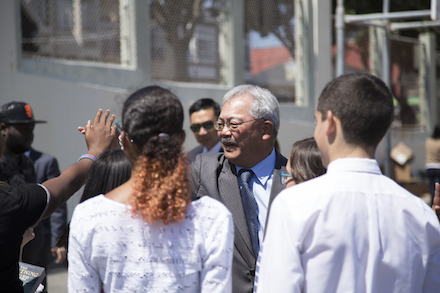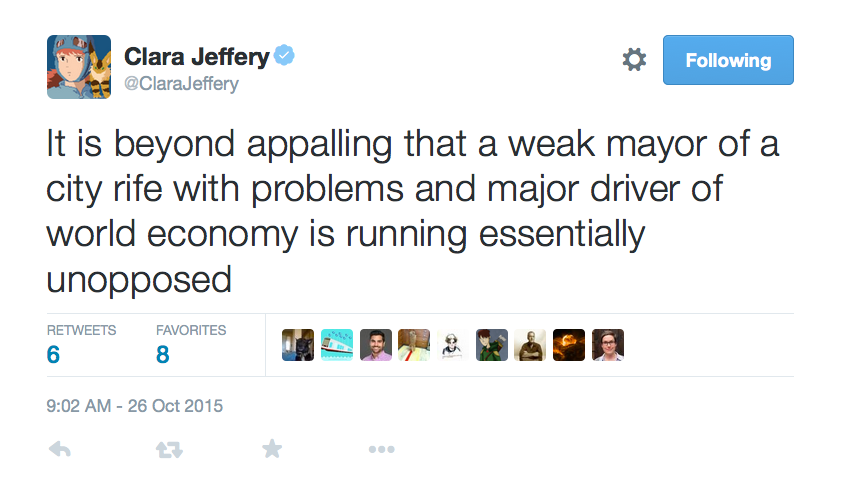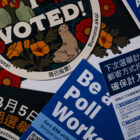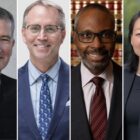Local journalists describe the dilemma of holding Mayor Lee accountable in a no-contest election
Mayor Ed Lee won re-election this November without breaking a sweat.
Five protest challengers stirred the race up but none had the political experience or financial backing to win.
With limited time and resources, San Francisco reporters said they chose to focus on other races whose outcomes were less certain, such as Proposition I (the housing moratorium) or District 3 supervisor — a choice that left some reporters conflicted about journalism’s watchdog mandate in a largely unwatched election.
“It’s not good for democracy or our ability to cover it,” said Marisa Lagos, a political reporter for KQED. “As a political reporter you have to be realistic. You don’t want to not mention people who don’t have a chance and you have to balance that with the fact that they’re not going to win.”
Tim Redmond, formerly of the San Francisco Bay Guardian and now publisher of 48 Hills Online, told the Public Press that he decided to devote his resources toward other issues.
“It matters terribly who the mayor is. This is a bad situation we’re in,” Redmond said. It is good that there were protest challengers, “but as a realist, I think there are other issues that will have a greater impact” on the city, such as the District 3 supervisor’s race.
In an Oct. 15 editorial, Jon Steinberg, editor-in-chief of San Francisco Magazine, decried the lack of a “real” mayor’s race:
“Like Lee or not, an actual race would have been good for the city. The mayor would have been forced to map out his plan for the next four years. He would have had to answer for the steady creep in evictions; for the scourge of homelessness; and, most of all, for the ongoing divide between the arriviste tech class and the fleeing middle class. Somebody might have even brought up the truly sketchy math underlying his promise to build 10,000 affordable units by 2020. Instead, he’s just coasting toward November,” Steinberg wrote.
This year’s mayoral race is starkly different from the last. In 2011, Lee won 60 percent of the vote after beating back 15 opponents, including a credible challenge from his left flank in the form of Supervisor John Avalos. This created a robust environment for political discourse in the media and around town. There were at least six mayoral debates that year. In 2015, there was only one.
Clara Jeffery, editor-in-chief of Mother Jones magazine, sparked a conversation on Twitter about the lack of a competitive mayor’s race with this post on Oct. 26:
“It is beyond appalling that a weak mayor of a city rife with problems and major driver of world economy is running essentially unopposed,” Jeffery wrote.
Some San Franciscans speculated that local angel investor Ron Conway played an outsized role in discouraging would-be challengers. A week before the election, Pando.com published an email from Conway to all of his “San Francisco-based SV Angel Portfolio CEOs” in which he asked them to share his personal list of election endorsements with their teams, including Lee as his choice for mayor.
“The media this election is not focusing on the reason Ed Lee is running unchallenged; it is because of Ron Conway and his cohorts spending half a million dollars against David Campos” during last year’s assembly race, Redmond said, “and the climate of fear he’s imposed on local politicians.”
In the absence of tough competitors, Lee did not seem eager to defend his record in the press. He snubbed the San Francisco Examiner this year by refusing to meet with its editorial board, according to an Examiner editorial on Oct. 15; the newspaper made no endorsement for mayor.
The San Francisco Chronicle did endorse Lee, however, with this mild caveat: “Mid-Market may be the best argument to both re-elect Mayor Ed Lee and demand more from the city’s cautious, conciliatory leader.”
The Chronicle ran one story about Lee’s challengers — “5 challengers to S.F. mayor push grassroots democracy” — but did not name a single one of them in a follow-up piece about Lee’s first term: “5 years of Ed Lee: How has the city changed under the mayor?”
In a pre-election interview, Lee asked a New York Times reporter: “Why isn’t there some big hitters who have experience in public office coming out and wanting to be the mayor of such a great city?” He answered his own rhetorical question by citing an overall rise in economic prosperity and a fall in the unemployment rate. Mark Leno, the former city supervisor and current state senator who demurred from running this year, disputed Lee’s rosy economic assessment of San Francisco, saying most of the new jobs have been taken by outsiders who have displaced city residents.
The five protest challengers did garner some mainstream media attention; Stuart Schuffman, aka Broke-Ass Stuart, was featured in a video from AJ+, a digital service of Al Jazeera America.
“For AJ+ the role of media covering political challengers who aren’t likely to win is to show what a protest campaign looks like,” Brooke Minters, a senior producer, told the Public Press by email.
Beyond protest candidates, whose responsibility is it to hold the mayor accountable in a no-contest race? San Francisco journalists say a true reckoning should have emerged from the political class. But that may have to wait until the next mayoral race in 2019.
Steinberg, of San Francisco Magazine, wrote Lee is “lucky that he doesn’t have to suffer the indignities of being questioned and challenged by a worthy opponent.”
“He’s lucky,” he added, “but San Francisco most definitely is not.”
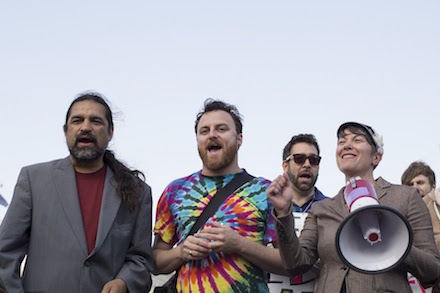
Note: Sara Bloomberg has freelanced as a reporter and photojournalist for numerous news outlets including KQED and 48 Hills Online.
